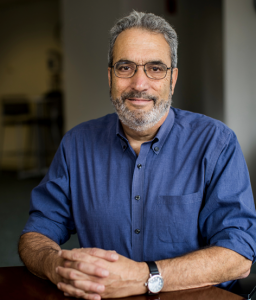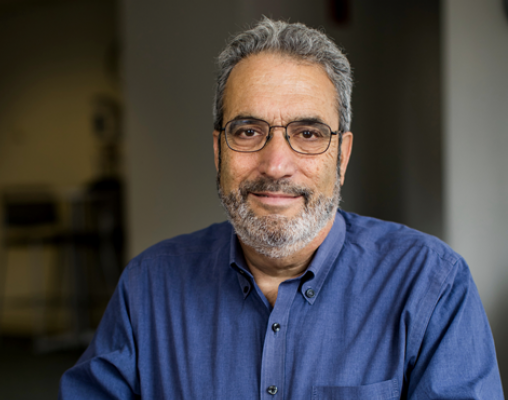What does strengths-based guidance mean for physicians and other providers counseling patients after screening them for adverse childhood experiences (ACEs)? It’s pretty straightforward, according to Dr. Robert Sege of Tufts University School of Medicine. When counseling people with ACEs, find out their strengths – as well as those of their family and community – and build on them throughout the discussion.
 “A great way to begin is to ask about those strengths in a systematic way,” said Sege in a Zoom interview from his office at Tufts, where he serves as Professor of Medicine and directs the Center for Community-Engaged Medicine. “You might start by asking open-ended questions like ‘How are things at home?’ ‘Is there a teacher at school who cares about you?’ ‘Is there another adult you can go to for help?’ ‘What do you do after school?’”
“A great way to begin is to ask about those strengths in a systematic way,” said Sege in a Zoom interview from his office at Tufts, where he serves as Professor of Medicine and directs the Center for Community-Engaged Medicine. “You might start by asking open-ended questions like ‘How are things at home?’ ‘Is there a teacher at school who cares about you?’ ‘Is there another adult you can go to for help?’ ‘What do you do after school?’”
Sege, a featured speaker in CCI’s Resilient Beginnings Network, is a leading researcher on the power of positive childhood experiences to counteract the negative impact of childhood trauma, which is linked to a higher risk of serious physical and mental illnesses across the lifespan.
“Imagine you have a patient who is 14 years old and immigrated here from another country, for example,” he said. “You learn she sings in the choir, that she babysits her younger brother and she’s doing well at school. She mentions some of her friends smoke marijuana, and being 14, she is vague about whether she is smoking it, too. You might say, ‘You are really a strong person, you have so much going for you, I’m sure you can figure out what to do to keep this from becoming a big problem. What else do you think might help?’”
This approach reflects the HOPE framework, an approach to childhood trauma developed by Sege, Christina Bethell and team that stresses the damage caused by ACEs can often be mitigated or even healed through positive childhood experiences (PCEs). In a study published in JAMA Pediatrics, lead researcher Bethell, Sege and colleagues found that adults who report more positive childhood experiences (PCEs) are less likely to suffer from depression or poor mental health and are more likely to have healthy relationships, whether or not they had experienced ACEs.
The early experiences that Sege and his colleagues found made a difference included being able to talk with family members about their feelings; feeling that their families stood by them during difficult times; enjoying participating in community traditions; feeling supported by friends; and feeling safe and protected by an adult in their home. The JAMA study has been bolstered by other research that has established the brain is not permanently damaged by toxic stress and is constantly responding to experience, according to Sege.
“We need to help people understand that just because they have a high ACE score, that doesn’t mean they’re permanently damaged,” he says. “When a person gets their ACE score, there’s a risk of stigma. And since many ACEs are often the results of historical trauma, we run the risk of further traumatizing marginalized communities. But if we look for their strengths, we can better understand their lives and help them heal…Changing the way we assess and approach the families we serve also opens the door to a more antiracist approach to caring for children.”
To tap into parent and family strengths, providers often begin by asking parents what they most enjoy doing with their children. Sege has found that asking parents how they choose their baby’s first name is another window into family dynamics and culture. Working with the American Academy of Pediatrics Bright Futures project, he contributed his expertise to a guide to talking with parents about ACEs screening, stressing an approach that affirms parents’ dignity and strengths. Sample questions for parents on resilience: “How do you take time for yourself? Who supports you? Are there any problems you are dealing with now?” (See the AAP guide on family strengths for sample parent questions and supportive answers on everything from resilience and social connections to social needs and knowledge of child development).
Helping parents promote supportive relationships – a key pillar of the HOPE framework – is crucial. “Being in healthy, sustained relationships is good for kids,” Sege said. “The relationship with their parents sets the stage for all other relationships, and we’ve also found that kids who have two or more close relationships with a trusted adult outside the home – including teachers, coaches and grandparents – are more likely to be resilient.”

Image credit: Shutterstock
The other pillars of HOPE, Sege says, are safe, equitable environments where kids can flourish and feel a sense of belonging (think schools, parks, playgrounds, and communities); engagement (a sense that you matter to other people and your communities), and opportunities to develop social and emotional intelligence (much of which comes from playing with peers).
Since kids with ACEs often feel devalued, Sege says, one way providers can encourage parents to build up their youngsters’ sense of self-worth and competence is by encouraging them to help out around the house. “One of the worst things you can do to children who have experienced trauma is to treat them like damaged goods,” Sege said. “Kids – like all of us – really benefit from the feeling that others depend on them. Chores aren’t always fun, but the feeling of being needed is so important.”
“What we want children to learn is that you matter,” he said. “To know that sometimes things go wrong, but you will get through it. What they need to hear is continued love and that the adults who know them best know that they can do better in the future.”
“I used to think teachers needed help erasing the blackboard,” Sege added. “But later I realized they were using chores to teach kids to be part of the community. What we want children to learn is that they matter.”
And pandemic or not, encouraging kids to get off the screen and go outside to play with other kids is equally valuable. “Maybe they’re out there playing four-square with chalk and a rubber ball, but what they’re really doing is building up their social and emotional intelligence,” Sege said. “There may be some arguing, and It isn’t always beautiful, but it’s better not to step in and say ‘stop squabbling.’ Because they’re learning how to work things out with other people, and little kids don’t necessarily have a sense of other people’s perspective. The goal isn’t to win; the goal is to work out differences, and peer play is where this happens the most.”
“The point is, folks shouldn’t feel like kids are fragile flowers, whether they have ACES or not,” Sege concludes. “Getting through little defeats, like losing a game, can help them recognize their own resilience. Children, whatever adversity they have been through, can learn to recognize that they have the inner strength to get through moments of stress.”
References
Sege, R, Bethell C, et al. Balancing ACEs with HOPE. 2017. https://hria.org/wp-content/uploads/2017/05/Balancing-ACEs-with-HOPE.pdf
Sege RD, Harper Browne C. Responding to ACEs with HOPE: health outcomes from positive experiences. Acad Pediatr. 2017;17(7S):S79-S85. doi:10.1016/j.acap.2017.03.007
Family Strengths: Questions for Parents. Bright Futures, American Academy of Pediatrics
https://brightfutures.aap.org/Bright%20Futures%20Documents/FAMILYSTRENGTHS_QuestionsForParents.pdf
Bethell C, Jones J, Gombojav N, Linkenbach J, Sege R. Positive Childhood Experiences and Adult Mental and Relational Health in a Statewide Sample: Associations Across Adverse Childhood Experiences Levels. JAMA Pediatr. 2019;173(11):e193007. https://jamanetwork.com/journals/jamapediatrics/fullarticle/2749336
Four Building Blocks of HOPE: Worksheets in English and Spanish. https://positiveexperience.org/resource/four-building-blocks-of-hope-interactive-worksheet-english-and-spanish/
Sege R, et al. Four Ways to Assess Positive Childhood Experiences. https://positiveexperience.org/resource/four-ways-to-assess-positive-childhood-experiences/
Find this useful or interesting? We’re constantly sharing stuff like this. Sign up to receive our newsletter to stay in the loop.

